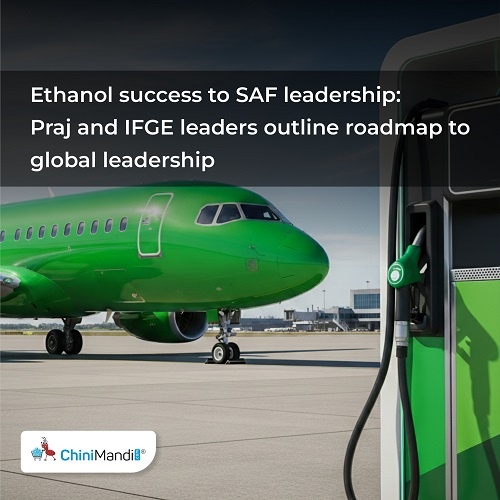India is making significant strides in biofuel production and supply. The proof of the success of the Ethanol Blending Programme lies in the fact that the country has achieved its 20% blending target five years ahead of schedule.
In an article dated 25th August 2025 (EBP transformed India’s energy sector, farmers’ fortunes & climate goals), Ravi Gupta, Chairperson, Sugar BioEnergy Forum, Indian Federation of Green Energy, and Executive Director said that the programme has not only benefitted our farmers and industry, but it has also brought a renaissance in green energy thought process in the country.
“Before 2014, there were hardly any discussions on green energy. The success of the ethanol blending programme has provided experience and confidence for both policymakers and producers to foray into other green energies. This is a big change, and also a crucial one,” he said.
Sustainable Aviation Fuel (SAF) is one of the important green fuels in the biofuel basket. It promises to change aviation and aims to make it cleaner and emission-free.
Recently, the Government released the Sustainable Aviation Fuel (SAF) Feasibility Study for India, reaffirming India’s readiness to become self-sufficient in SAF production. The study targets 1% blending by 2027, 2% by 2028, and 5% by 2030, in line with the CORSIA mandate.
Opportunities and Challenges
Atul Mulay, President of BioEnergy at Praj Industries, weighs in on SAF, citing a Deloitte report and several other studies to highlight India’s strong potential in SAF production.
“The recent Deloitte report estimates the country could produce about 10–12.5 billion litres of SAF annually by 2040, provided the right investments are made. This not only meets domestic blending needs but also creates room for India to emerge as a global exporter and leader in SAF,” he said.
Mulay said that just as the Ethanol Blending Programme (EBP) demonstrated how coordinated policy, technology, and industry efforts can deliver measurable success, the same approach can be replicated for SAF.
“To unlock this opportunity, we will need progressive blending mandates, fiscal and policy incentives, efficient feedstock aggregation, and internationally aligned certification systems. With these enablers, India can position itself at the forefront of the global SAF transition,” he added.
Ravi Gupta, Chairman of the Sugar Bioenergy Group at the Indian Federation of Green Energy, affirmed that India has a significant scope to become a global supplier of SAF.
However, he said, “SAF needs big investments, and to be successful, it is important that the aviation industry has a buy-back agreement with producers, which shall help in making the project bankable and give certainty of off-take”, Gupta concluded.


















India will become a Global leader in ethanol production since it’s diversified climatic zones across the territory.
But at the same time we have to maintain the food production also to feed the millions without depending on other countries.